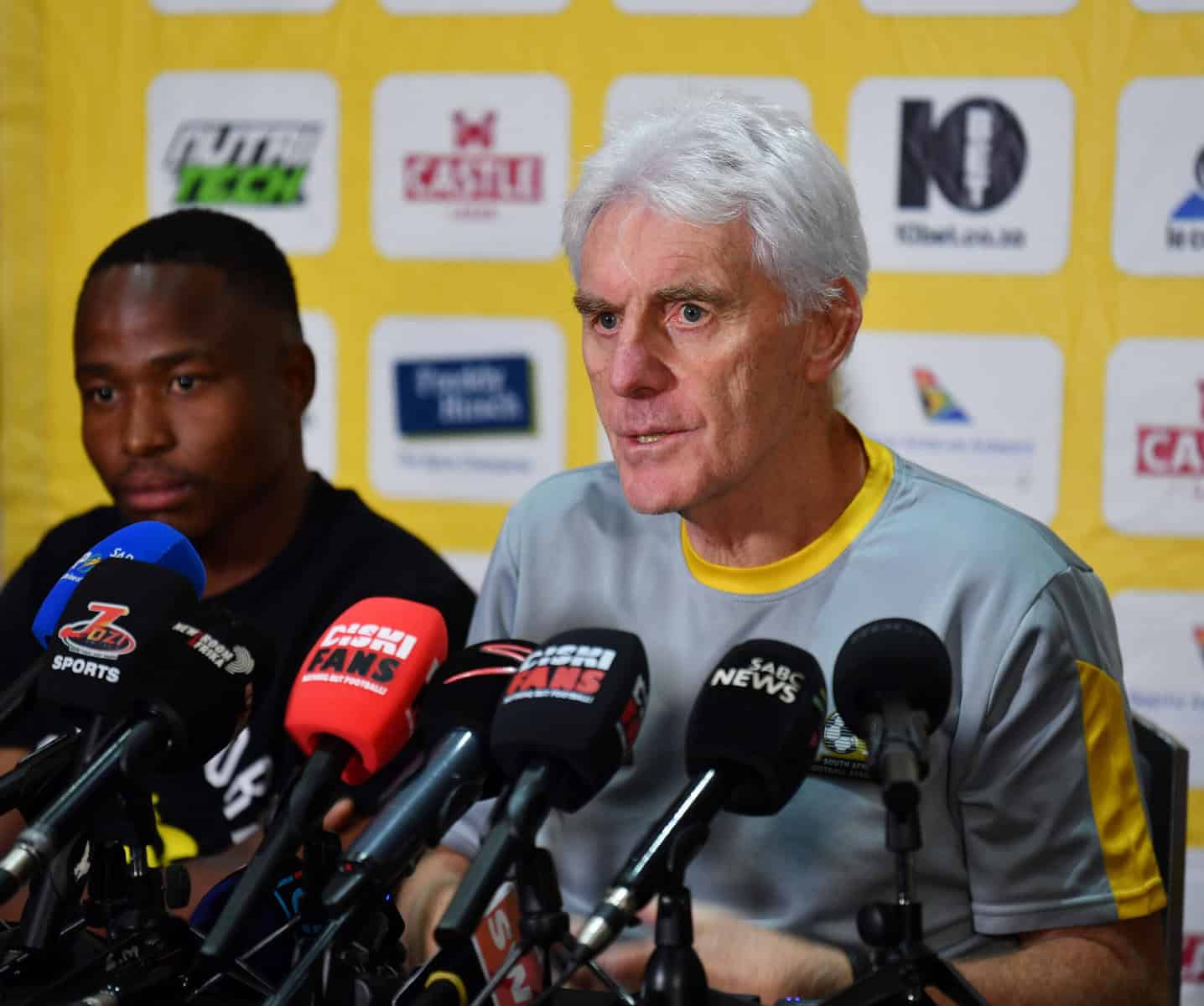The week has offered equal parts hard steel and raw emotion for South African football. At the heart of it sits the Bafana Bafana and Coach Broos Controversy, a storm stirred by squad choices, bracing public comments, and the very real dreams of players who see a window opening. Hugo Broos has dismissed online criticism as nonsense, Gift Links’ camp has pushed back after a sharp assessment, and an emerging Orlando Pirates midfielder, Masindi Nemtajela, has embraced his chance with gratitude and grit.
Saturday’s international friendly against Zambia carries real weight, even if it is not a qualifier. It is the final tune-up before AFCON, set to take place in Morocco next month, and kick-off is at 6pm at Nelson Mandela Bay Stadium in Gqeberha. For Broos, this match is both a proving ground and a selection lab as South Africa primes itself for AFCON in Morocco.
Broos pushes back at the noise and sets a firm tone
Broos has taken aim at the waves of online criticism around his latest squad. He said some of the social media chatter is “nonsense and ridiculous,” and insisted that it does not touch him. The Belgian mentor made clear he does not follow online discussions and that he will not be swayed by them, even as the intensity rises around his choices and methods. That position places the coach in a familiar trench, insulated from social media reaction as he shapes his squad.
“Well, I have to thank you for saying that, because I didn’t know. You know how I feel and think about social media, I don’t follow that at all.”
“If I read those things, I will laugh because those are people who think they are important. They are on social media and think they can say whatever they want.”
“It is really nonsense and ridiculous and it doesn’t affect me at all.”
The Lorch omission and a selection riddle
The latest squad announcement rekindled debate when Broos left out on-form Wydad Casablanca attacker Thembinkosi Lorch for the Zambia friendly. When a player is producing for club and still misses a call-up, questions naturally follow, and Lorch’s absence has been a central talking point in the build-up. The omission of Thembinkosi Lorch has become a lightning rod for wider views on form versus fit, and on how the coach values certain roles in his system.
Winning mindset meets selection experiments
Broos has drilled home a simple message ahead of Zambia. Friendly or not, he wants intensity, focus, and a result, all while keeping the door open to evaluate options. It is a delicate balance, one eye on a result and the other on the bigger tournament horizon, and he has framed this weekend as a crucial audition for a handful of hopefuls, a true last opportunity to convince.
“So, it wouldn’t be a good thing if we lost the game on Saturday. I will ask every player to focus and concentrate the same way they do during the qualifiers. Even if it’s not a qualifier, I will not accept players taking this game as a little holiday. I want to win on Saturday. On the other side, it’s also the last opportunity to call some players I want to see a little bit closer.”
Gift Links and the fallout from a blunt assessment
When Broos was asked why Gift Links continues to be overlooked, he answered with a line that reverberated beyond South Africa. “I don’t think Links has the level that we need at Bafana,” the coach said, a judgment that quickly drew a response from Links’ representative, Paul Mitchell. Mitchell, the Managing Director of Siyavuma Sports Group Africa, shared that Links was upset and that the public framing was unnecessary, thrusting Gift Links into the heart of the debate.
“Normally, I wouldn’t comment on this sort of thing because it’s the coach’s prerogative to pick who he feels fit for his squad, but I’ve been inundated by the Danish media on this story because it’s blown up in Denmark.”
“From Gift’s side, he’s upset and rightfully so. The comments were uncalled for. Gift has never gone public or complained about not being in the squad.”
What the numbers say about Links in Denmark
Mitchell pointed to a strong body of work at Aarhus GF. Links, 27, has been a key figure as AGF climbed to third in the Danish league after 15 matches, and he has produced two goals and three assists in league play. He also scored and assisted in two cup games, helping AGF reach the quarter-finals, a resume that Mitchell believes proves Links’ value in the Danish Superliga.
“The Danish media are actually laughing because Hugo Broos has come out to say that Gift doesn’t have the level to play for Bafana but he’s quoted as being the left wingback in the Danish Super League.”
“If we’re saying the Danish Super League is lower level than the South African PSL then we’ve got a problem.”
Mitchell added detail to underline the long arc of Links’ European journey. He said Links moved to Denmark for €850,000, around R16.8 million, and has turned down strong offers since. According to Mitchell, Links has made the team of the week five times this season, and last season he made the league’s team of the season, which Mitchell says included him as the only foreign player, a distinction used to emphasize his consistency at the top end of the team of the season conversation.
Nemtajela’s gratitude and the joy of a dream realized
Against the noise around selection and status, Masindi Nemtajela’s story cuts through with warmth and belief. The Orlando Pirates midfielder, called up for the Zambia friendly, spoke of the journey from the dusty fields of Soweto to a chance with the national team. For Masindi Nemtajela, the week is a marker of how quickly life can change when persistence meets opportunity.
“I’m grateful for the opportunity that coach Hugo Broos has given us, because I would also like to see myself fighting for the nation at the World Cup. He has given us an opportunity and now it’s up to us to use the chance given to us.”
Nemtajela described a rapid rise. From the Kwa-Mahlobo Games to the NFD, then the PSL, before earning a Pirates contract, he has seized each rung of the ladder. After only 11 games for the Buccaneers, his national team call-up arrived, and the 24-year-old knows what a debut against Zambia would mean as he eyes his long-term ambitions in the shirt he has always dreamed of. It is a journey told with humility, backed by a belief that hard work can outpace even the best-laid plans, and it has been rewarded with a stage he intends to honor.
“In my whole career I’m really grateful for what’s happening to me. I haven’t had an easy journey. I started at the Mahlobo games like you mentioned, playing on gravel. But then my things started to move very fast. Soon I found myself playing in the NFD, then the next season I’m in the PSL and then the second season I was signed by Pirates.”
“Then after some months, maybe after six games my name is called to the national team. So, I’m really grateful, which means that the hard work I’m putting in at training is paying off.”
Broos himself has reiterated that friendlies are not holidays, and that he expects total commitment while still giving new faces a fair shot to impress. It is a dual demand that tests mindset and execution before the squad list is finalised for next month. For those on the fringes, it is a rare and precious window to show they belong among the new players pushing for AFCON spots.
“We are preparing for the friendly game against Zambia on Saturday. But for me, friendly games do not exist. Every game we have to be focused and concentrate fully, and we have to try and win that game. It will not be any different for this game. I want to win on Saturday.”
Reading the room and the road ahead
There are two intertwined currents here. One is the cold clarity of selection, where the coach prioritises his idea of what the team needs, even if it runs against public sentiment. The other is the human response to public judgments, where players and their representatives ask for respect in how decisions are framed, especially when statistics and performances suggest they deserve consideration. These currents do not cancel each other out, they define the tension that makes international football a cauldron where careers and opinions boil together.
For Broos, the Zambia match is a tactical exercise and a temperature check. For players like Nemtajela, it is a chance to shift a conversation from noise to evidence. For those outside the squad like Links, it is a reminder that selection debates travel, crossing borders and stirring pride far from home. In the coming days, what happens on the grass in Gqeberha will matter most, and the result will fold into the broader story of how this group measures itself under pressure.
Key storylines to watch
- The selection debate around Thembinkosi Lorch and what his absence signals about role profiles,
- How Broos balances the drive to beat Zambia with the need to assess depth before AFCON,
- Whether emerging names like Masindi Nemtajela can turn opportunity into a lasting national team place.
Through it all, the images are vivid. A coach standing firm amid criticism. A winger in Denmark whose consistency is being championed back home. A midfielder who lifted himself from gravel pitches to the national crest. These are the strands that make sport more than a fixture list, they make it a living drama that asks us to look closer, feel deeper, and decide what we value most in our teams.
When the whistle goes in Gqeberha, principles will meet performance. Broos has set a challenging standard and has invited players to meet it without excuses. The coming ninety minutes will not settle every debate, but they will speak loudly to the identity of Bafana Bafana at a moment when identity matters as much as form.






